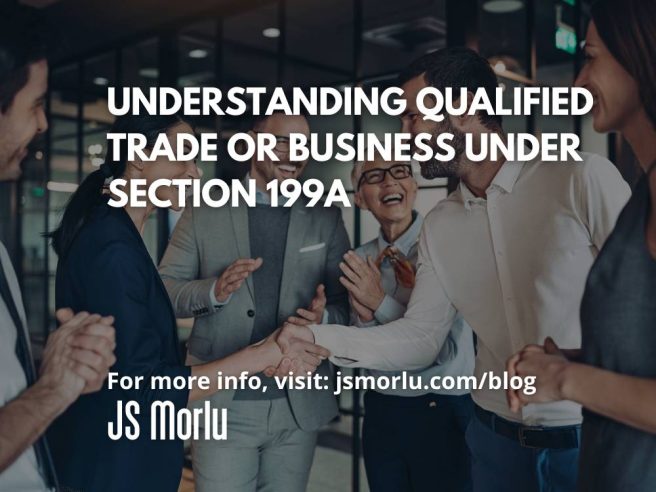By: John S. Morlu II, CPA
The Qualified Business Income (QBI) deduction, established by Section 199A of the Internal Revenue Code, allows eligible taxpayers to deduct up to 20% of their qualified business income. However, not all businesses are eligible. Understanding what qualifies as a “qualified trade or business” is essential for determining eligibility for this valuable tax break.
What is a Qualified Trade or Business?
Under Section 199A(d), a qualified trade or business includes most trades or businesses, except:
1. Specified Service Trades or Businesses (SSTBs): Certain service-based industries face limitations or exclusion.
2. Employee Services: Income earned as an employee does not qualify for the deduction.
To qualify, an activity must meet these general requirements:
- The taxpayer’s primary purpose for engaging in the activity is income or profit.
- The taxpayer is regularly and actively involved in the activity.
Activities classified as hobbies or occasional ventures do not qualify. The IRS relies on the definition of “trade or business” under Section 162(a), which focuses on profit motives and the regularity of operations.
Specified Service Trade or Business (SSTB): A Key Limitation
One significant limitation to the QBI deduction is its application to income from Specified Service Trades or Businesses (SSTBs). These businesses face phase-outs or complete elimination of the deduction if taxable income exceeds certain thresholds. For 2024, these thresholds are:
- $383,900 (married filing jointly)
- $191,950 (all others)
Industries Considered SSTBs
The IRS lists the following fields as SSTBs, where income may be subject to limitations:
| Industry | Examples |
| Health | Doctors, dentists, chiropractors, and other health professionals. |
| Law | Attorneys, paralegals, and legal consultants. |
| Accounting | CPAs, bookkeepers, and other accounting professionals. |
| Actuarial Science | Actuaries and related professionals. |
| Performing Arts | Actors, singers, musicians, and other entertainers. |
| Consulting | Business consultants, strategic advisors, and other professional advisors. |
| Athletics | Professional athletes, coaches, and sports trainers. |
| Financial Services | Investment advisors, wealth managers, and financial planners. |
| Brokerage Services | Real estate brokers and stockbrokers. |
| Investing & Management | Fund managers and investment management firms. |
| Trading | Securities and commodities traders. |
| Dealing in Securities | Businesses engaged in buying and selling securities. |
| Reputation or Skill | Businesses primarily reliant on the reputation or skill of owners. |
What Does “Reputation or Skill” Mean?
Initially, there was concern that many skill-based entrepreneurs (like plumbers or electricians) might fall into the “reputation or skill” category and lose eligibility. However, regulations have clarified this term. “Reputation or skill” is narrowly defined to include situations where:
- The taxpayer earns income from using their personal likeness (e.g., endorsements).
- The taxpayer is paid for product endorsements or personal appearances.
This narrower definition ensures that most skill-based trades and businesses, such as contractors and independent tradespeople, remain eligible for the QBI deduction.
SSTB Exemptions: Engineering and Architecture
Engineering and architecture firms are explicitly excluded from the SSTB category. These industries retain full access to the QBI deduction, regardless of income level, reflecting a specific decision by Congress to encourage growth and investment in these fields.
Single vs. Multiple Trades or Businesses
For businesses operating in multiple industries, the IRS requires careful evaluation to determine whether the business has:
1. A single trade or business or
2. Multiple distinct trades or businesses.
Each business must meet the profit motive and regular activity tests independently to qualify for the QBI deduction.
Why This Matters
Understanding whether your business qualifies as a “qualified trade or business” under Section 199A is crucial. While most businesses are eligible, those operating in SSTB industries must carefully monitor their income levels and plan accordingly to maximize tax savings. Consulting with a tax professional is essential for businesses near income thresholds or those with activities spanning multiple industries.
With the QBI deduction set to expire after 2025 unless extended, now is the time to take advantage of this significant tax-saving opportunity.
Author: John S. Morlu II, CPA
John S. Morlu II, CPA, is the CEO and Chief Strategist of JS Morlu, a globally acclaimed public accounting and management consulting powerhouse. With his visionary leadership, JS Morlu has redefined industries, pioneering cutting-edge technologies across B2B, B2C, P2P, and B2G landscapes.
The firm’s groundbreaking innovations include:
• ReckSoft (www.ReckSoft.com): AI-driven reconciliation software revolutionizing financial accuracy and efficiency.
• FinovatePro (www.FinovatePro.com): Advanced cloud accounting solutions empowering businesses to thrive in the digital age.
• Fixaars (www.fixaars.com): A global handyman platform reshaping service delivery and setting new benchmarks in convenience and reliability.
Under his strategic vision, JS Morlu continues to set the gold standard for technological excellence, efficiency, and transformative solutions.
JS Morlu LLC is a top-tier accounting firm based in Woodbridge, Virginia, with a team of highly experienced and qualified CPAs and business advisors. We are dedicated to providing comprehensive accounting, tax, and business advisory services to clients throughout the Washington, D.C. Metro Area and the surrounding regions. With over a decade of experience, we have cultivated a deep understanding of our clients’ needs and aspirations. We recognize that our clients seek more than just value-added accounting services; they seek a trusted partner who can guide them towards achieving their business goals and personal financial well-being.
Talk to us || What our clients says about us



